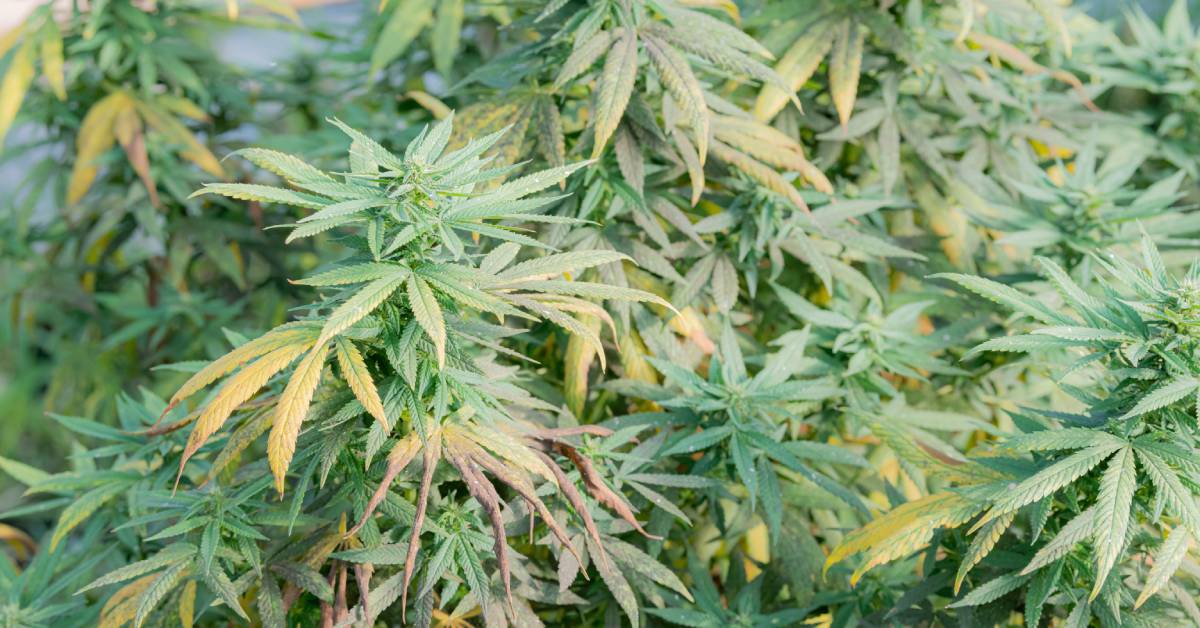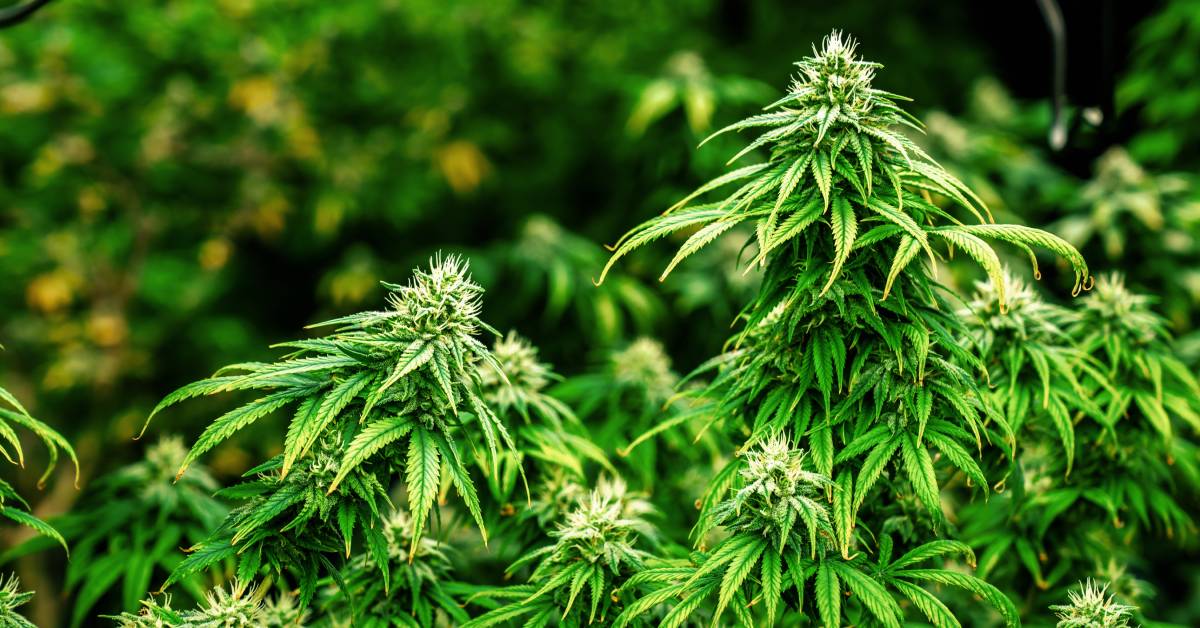6 Common Viruses That Affect Cannabis Plants
A virus is a microscopic infectious agent that requires a living host to multiply. Unlike bacteria, viruses cannot survive or reproduce outside a living cell. Once a virus infiltrates a host cell, it hijacks the cell’s machinery to replicate itself.
Cannabis plants are not immune to viruses. Use this guide to learn the common viruses that affect cannabis plants and how to protect your crop.
1. Tobacco Mosaic Virus
Tobacco mosaic virus (TMV) is one of the most well-known plant viruses, affecting a wide range of crops, including cannabis. TMV is a single-stranded RNA virus that spreads through mechanical transmission, often via contaminated tools, hands, or infected plant material. Early detection is crucial, as TMV can cause severe damage to cannabis plants.
Symptoms of TMV include mosaic-like patterns of light and dark green areas on the leaves, distorted or stunted growth, and reduced yield. In some cases, infected plants may show necrotic spots or streaks on the leaves and stems.
2. Hop Latent Viroid
Hop latent viroid (HLVd) is another significant threat to cannabis growers. HLVd is a circular, single-stranded RNA molecule that remains latent in infected plants. This means that it shows no symptoms until triggered by stress factors such as temperature changes or nutrient deficiencies. This viroid primarily spreads through vegetative propagation, making it a concern for growers who use cloning methods.
Symptoms of HLVd infection may include stunted growth, reduced vigor, and a decline in overall plant health. Infected plants may also exhibit leaf curling, chlorosis, and diminished resin production. The latent nature of HLVd makes detection challenging, so regular monitoring and testing are important.

3. Lettuce Chlorosis Virus
Lettuce chlorosis virus (LCV) predominantly affects plants in warmer climates. The virus is transmitted by the whitefly. Once infected, cannabis plants exhibit symptoms such as yellowing leaves, stunted growth, and reduced yield. The virus disrupts photosynthesis, which leads to chlorosis and, eventually, necrosis of the plant tissue.
Detecting LCV requires keen observation and occasionally demands laboratory testing. Growers must routinely inspect their plants for signs of infection.
Additionally, managing whitefly populations is crucial for preventing the spread of LCV. Using insecticidal soaps and introducing natural predators like ladybugs helps control whitefly infestations. Maintaining optimal growing conditions, including proper ventilation and humidity control, can also deter whitefly populations.
There isn’t a cure for LCV. Nevertheless, diligent cultivation will have a positive impact on your plants’ health and yield.
4. Cucumber Mosaic Virus
Cucumber mosaic virus (CMV) is another prevalent virus affecting cannabis plants. Belonging to the Bromoviridae family, CMV is highly versatile and can infect over 1,200 plant species, including cannabis. Aphids, thrips, and even human activity can transmit the virus. Infected plants exhibit mottled or mosaic-like leaf patterns, growth distortion, and flower abnormalities.
Early detection of CMV is vital for minimizing its impact. Growers should monitor their plants for unusual leaf patterns or growth irregularities. Integrated pest management (IPM) strategies are essential for controlling the insect vectors that spread CMV. Introducing beneficial insects like parasitic wasps and using organic insecticides can reduce aphid and thrip populations.
5. Cannabis Cryptic Virus
Cannabis cryptic virus (CCV) is a double-stranded RNA virus that infects cannabis plants without visible symptoms. Despite its cryptic nature, CCV can negatively impact plant health and yield. The virus is transmitted through seed or pollen, and once established, it can persist in the plant without causing obvious signs of infection.
The presence of CCV in cannabis plants leads to subtle impairment, such as reduced vigor, lower yields, and increased susceptibility to other pathogens. Growers may not realize their plants are infected until they notice a decline in overall performance.
6. Arabis Mosaic Virus
Arabis mosaic virus (ArMV) isn’t as prevalent as the other viruses, but it’s equally detrimental. Part of the Nepovirus genus, ArMV is transmitted primarily through nematodes and infected seeds.
Cannabis plants infected with ArMV exhibit symptoms such as leaf mottling, vein clearing, and reduced vigor. The virus disrupts the plant’s cellular functions, leading to stunted growth and poor yields.
Detecting ArMV requires careful observation and sometimes laboratory confirmation. Growers should regularly inspect their plants for signs of infection, especially in areas known to have nematode issues. Soil solarization, crop rotation, and biological control agents like nematode-trapping fungi can help reduce nematode numbers.
Using certified virus-free seeds and planting material is another effective prevention strategy. Although there is no cure for ArMV, implementing comprehensive nematode management and following cannabis cultivation best practices will keep your cannabis garden thriving.

Helpful Tips To Prevent These Viruses
Sanitize Tools and the Growing Room Frequently
Failure to sanitize gardening tools may result in the spread of harmful pathogens, such as viruses and bacteria, between plants. This leads to widespread infections and significant damage throughout your garden. Regularly cleaning and sanitizing your tools minimizes this risk.
First, choose disinfectants specifically designed to kill plant pathogens. After each use, clean your pruning shears, scissors, and other tools with these disinfectants. Next, if you’re using reusable gloves, ensure they are washed and sanitized after every use. Disposable gloves are an alternative to avoid contamination.
Lastly, remember that other surfaces in your growing environment, such as benches and tables, also need regular sanitization. Viruses can linger on these surfaces and spread to the plants, so maintain a routine cleaning schedule to keep your growing area virus-free.
Conduct Routine Diagnostic Testing
Regular diagnostic testing is another critical strategy for preventing cannabis viruses. Early detection allows for prompt action, preventing the virus from spreading to healthy plants.
Now that you’re familiar with the signs of common viruses that affect cannabis plants, you know what to look for. Visually inspect your plants first. Then, use a laboratory test to detect viruses at an early stage.
Remove Infected Plants Promptly
Leaving an infected plant in the garden increases the risk of spreading the virus. Viruses quickly travel from plant to plant, so it’s crucial to quickly remove damaged cannabis.
Carefully uproot the plant, ensuring that you do not disturb the surrounding soil too much. Dispose of the plant in a way that prevents the virus from returning to your growing environment, such as burning or placing it in a sealed bag for disposal.
Additionally, after removing the infected plant, thoroughly clean the area where it was growing. This includes sanitizing the soil and any pots or containers that housed the plant.
Nourish the Plants
Healthy, well-nourished plants are more resistant to viruses and other pathogens. Ensuring your cannabis plants receive the right nutrients enhances their natural defenses, making them less susceptible to infections.
Test the soil or evaluate the water’s pH. Based on the results, supplement with appropriate fertilizers to provide a balanced mix of macro- and micronutrients.
Shore Grow wants to help you safeguard your cannabis plants so you can cultivate a flourishing garden. On our website, you’ll find everything from growing room equipment to healthy additives like New Millenium nutrients. Browse our website to find all the items you need to grow robust, virus-free cannabis plants today!
Recent Posts
-
Choosing the Right Media for Moisture in Early Spring
Early spring brings changing rhythms to indoor grow rooms. Humidity jumps, temperatures swing a lot …Feb 22nd 2026 -
How to Boost Seedling Growth With Spring Lighting Accessories
As late February pushes into early March, we’re getting our setups ready to bring seedlings to life …Feb 22nd 2026 -
Propagation Tricks for Getting Peppers Started Indoors
Starting peppers indoors before winter ends gives them the head start they need. These plants take t …Feb 20th 2026




